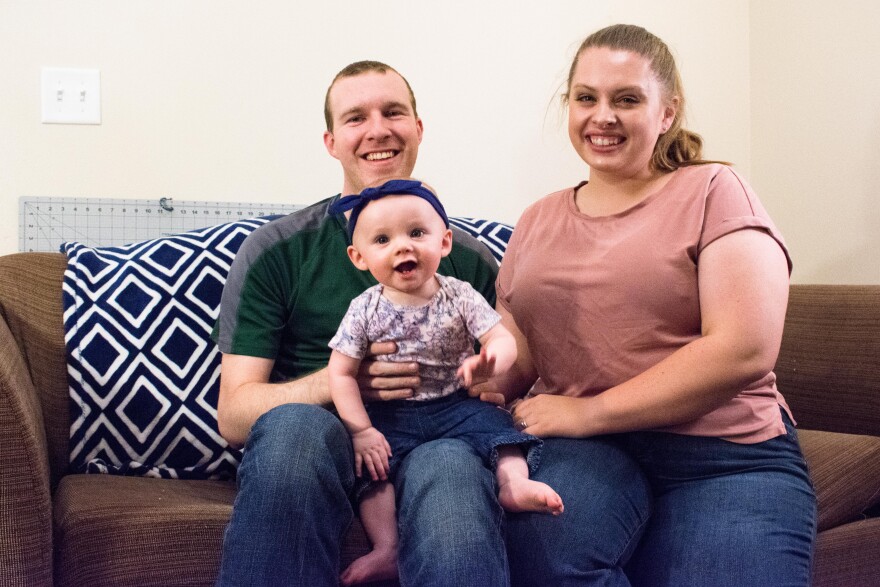22-year-old Kaydee Edralin is a few credits shy of graduating from college. She’s been saving money by living with her parents in Meridian while she waits to go back to Brigham Young University-Idaho in Rexburg.
Edralin had just gotten married in October and had planned out every detail of her family’s new budget.
That includes signing up herself and her husband under Idaho’s Medicaid expansion, which is a taxpayer-funded program that covers low-income people, pregnant women and those with disabilities.
But then something happened she didn’t plan for.
“I freaked out," Edralin said. "Obviously, we don’t have a lot of money."
Just two months before the next semester starts in January, right when the expansion gets off the ground, Brigham Young University-Idaho decided it wouldn’t consider Medicaid to be a valid form of insurance. The university is affiliated with the Church of Jesus Christ of Latter-day Saints, which is widely known as the Mormon church.
Now, Edralin, her husband, and many other students will have to buy a private insurance plan or a relatively expensive student plan that offers limited coverage – or they won’t be allowed to enroll.
“We just got married, we’re college students and suddenly, now, I’m going to have over $1,000 extra each semester to pay for me and my husband in insurance when we’re covered by [Affordable Care Act-compliant], full-coverage Medicaid,” she said.
It’s pretty common for both public and private colleges in the U.S. to require students to have health insurance, but the record is mixed on whether schools will accept Medicaid, according to Valerie Lyon, a healthcare consultant who specializes in student health benefits.
Based on the American College Health Association’s standards, it says most student plans across the country are high-quality, federally compliant and can generally move with the student if they go abroad or get sick while they’re away from school.
But in a recent interview, Jill Horwitz, a dean and law professor at UCLA Law School, says BYU-Idaho’s plan made her raise her eyebrows.
“It appears that the school is requiring its students as a condition of being a student to purchase something that has many of the hallmarks of health insurance, but really isn’t health insurance at all,” Horwitz said.

As previously reported by Boise State Public Radio, the plan is administered by Deseret Mutual Benefit Administrators, which was established by the LDS church. It isn’t classified as an insurance company and it doesn’t have to comply with federal requirements.
It has annual caps on how much it’ll pay for coverage and it won’t pay for catastrophic situations like a fire or school shooting if too many people enrolled in the plan are hurt or killed.
Seth and MaCae Bairett have been on Medicaid for about a year. They’re in their mid-20s and live in Rexburg with their 7-month-old daughter, Lyssa, while attending BYU-Idaho.
State data shows Madison County, where the university is located, has the highest concentration of people eligible for Idaho’s Medicaid expansion.
MaCae said the school’s decision will add financial pressure to their lives, since they’re full-time students.
“It’s going to make or break us,” she said. “We were hoping to put a little bit into savings so when we graduate, we’d have a little bit of money to do first and last month’s rent.”
But now, they say that’s unlikely.
Up until this month, BYU-Idaho had accepted the state’s Medicaid plan. Actually, BYU’s main campus in Provo, Utah, still takes it.
Seth says the school’s lack of transparency is troubling, especially when he had to learn the news on Facebook.
“Because we weren’t given any information at all until it was absolutely necessary and all over the place, our concern is that this was done purely because someone realized they could make extra money,” he said.

After more than a week of uproar from students, the school issued a statement. They say with more than 20,000 students enrolled on campus, “… it would be impractical for the local medical community and infrastructure to support them with only Medicaid coverage.”
But local healthcare providers say that’s not true.
“That hasn’t been one of our topics of discussion,” said Doug McBride, communications director for Madison Memorial Hospital in Rexburg. As the largest healthcare provider in the area, McBride said his organization and the university have regular discussions about the health of students.
While he respects the school’s decision, he says his hospital and its affiliated clinics are ready for the expected surge of Medicaid patients.
“We are perfectly capable of handling what needs we have. We’ve got the infrastructure to handle the medical needs of the community.”
20 different clinics in Rexburg have also told the Idaho Department of Health and Welfare that they're accepting new Medicaid patients.
Students say they’re thankful BYU-Idaho finally gave them a reason for the change after weeks of silence, but thousands have signed a petition asking the school to reverse its decision. Several have called the move un-Christlike.
A student group has also organized “Medicaid Mondays” where they hope to flood the administration’s offices in person as a show of dissent.
As for Kaydee Edralin, the student who’s waiting to finish her last few classes, Medicaid will be a big help for her. She’s got a lingering foot injury and other health problems she hasn’t been able to treat with the student plan that she's been required to buy, even though she's not currently enrolled in classes and isn't living in Rexburg.
“I’m in a boot right now [and I] can’t even go to the doctor because I can’t afford that,” Edralin said.
She’s graduating next year, while her husband has a while to go to get his diploma.
They had budgeted to leave college debt-free. But if administrators don’t change their minds, she says they will have to take out a loan for at least $3,000 to buy unnecessary coverage they won’t use.
Follow James Dawson on Twitter @RadioDawson for more local news.
Copyright 2019 Boise State Public Radio




